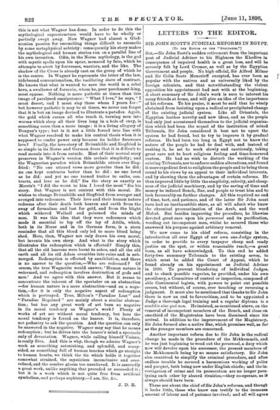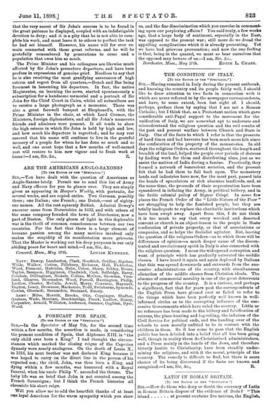LETTERS TO THE EDITOR.
SIR JOHN SCOTT'S JUDICIAL REFORMS IN EGYPT.
[To THE EDITOR. OP 1115 " EIPPCTS.POR:1 Sin,—Sir John Scott's sudden retirement from the important post of Judicial Adviser to his Highness the Khedive in consequence of impaired health is a great loss, and will be severely felt by Lord Cromer, as well as by the Egyptian Government and people. No high official, Sir Alfred Milner and Sir Colin Scott Moncrieff excepted, has ever been as popular with the natives and as universally liked by the foreign colonists, and that notwithstanding the violent opposition his appointment had met with at the beginning. A short summary of Sir John's work is sure to interest his many friends at home, and will give an idea of the importance of his reforms. To his praise, it must be said that he wisely abstained from insisting upon a radical or precipitated change of the existing judicial system. Like all Orientals, the Egyptian loathes novelty and new ideas, and as the people had only just accustomed themselves to the judicial organisa- tion which had been the sequel of the institution of mixed Tribunals, Sir John considered it best not to upset the system he had found, but to try to improve it by gradual reforms. He had been too long in Egypt not to know the nature of the people he had to deal with, and instead of rushing it, he set to work slowly and cautiously, taking great care not to hurt religious feeling and time-honoured custom. He had no wish to disturb the working of the existing Tribunals, nor to enforce sudden alterations, and found it more expedient first to enlighten the people and to bring them round to his views by an appeal to their individual interests, and by showing them the advantages of certain reforms. He thus improved little by little the simplicity, celerity, and cheap- ness of the judicial machinery, and by the saving of time and money he induced Bench, Bar, and people to trust him and to look favourably on further changes. All this required no end of time, tact, and patience, and of the latter Sir John must have had an inexhaustible store, as all will admit who know the chronical procrastination of the Arab, and the word Malesh. But besides improving the procedure, he likewise devoted great care upon his personnel and its purification, weeding out incompetent men, whilst he secured those who answered his purpose against arbitrary removal.
We now come to his chief reform, consisting in the introduction all over Egypt of our own one-Judge system, in order to provide to every taxpayer cheap and ready justice on the spot, or within reasonable reach,—a great boon, as all have acknowledged. To this end he added forty-two summary Tribunals to the existing seven, to which must be added the Court of Appeal, which he found already on his appointment as Judicial Adviser in 1890. To prevent blundering of individual Judges, and to check possible vagaries, he provided, under his own presidency, a Committee of control or inspection, composed of able Continental legists, with powers to point out possible errors, but without, of course, ever touching or reversing a judgment. It must also be mentioned that thanks to Sir John there is now an end to favouritism, and to be appointed a Judge a thorough legal training and a regular diploma is a conditio sine gad non. He insisted, as mentioned above, on the removal of incompetent members of the Bench, and close on one-third of the Magistrates have been dismissed since his arrival. In addition to the improvement of the Magistracy, Sir John formed also a native Bar, which promises well, as far as the younger members are concerned.
Another important reform due to Sir John is the radical change he made in the procedure of the Mekkemmeh, and he was just beginning to weed out the personnel, a duty which now will devolve upon his successor, the present members of the Mekkemmeh being by no means satisfactory. Sir John also contrived to simplify the criminal procedure, and after endless trouble he secured a harmonious working of police and parquet, both being now under English chiefs; and the in- vestigation of crime and its prosecution are no longer para- lysing each other by absurd rivalries,—they co-operate, as it always should have been.
These are about the chief of Sir John's reforms, and though it looks little, those who know can testify to the immense amount of labour and of patience involved; and all will agree that the very secret of Sir John's emcees is to be found in the great patience he displayed, coupled with an indefatigable devotion to duty; and it is a pity that he is not able to com- plete his work, and must leave it to others to perfect the task he had set himself. However, his name will for ever re- main connected with these great reforms, and he will be gratefully remembered by generations to come and a population that owes him so much.
The Prime Minister and his colleagues are likewise much affected by Sir John's premature departure, and have been profuse in expressions of genuine grief. Needless to say that he is also receiving the most gratifying assurances of high esteem and regret from all quarters,—Bench and Bar being foremost in lamenting his departure. In fact, the native Magistrates, on learning the news, started spontaneously a subscription for a handsome memorial and a portrait of Sir John for the Chief Court in Cairo, whilst all subscribers are to receive a large photograph as a memento. There was also a great farewell banquet at Shepheard's, with the Prime Minister in the chair, at which Lord Cromer, the Ministers, foreign diplomatists, and all Sir John's numerous friends and admirers were present It all tends to show the high esteem in which Sir John is held by high and low, and how much his departure is regretted ; and he may rest assured that his name will continue to live in the grateful memory of a people for whom he has done so much and so well, and one must hope that a few months of well-earned rest will restore to him new vigour and to fresh work at







































 Previous page
Previous page